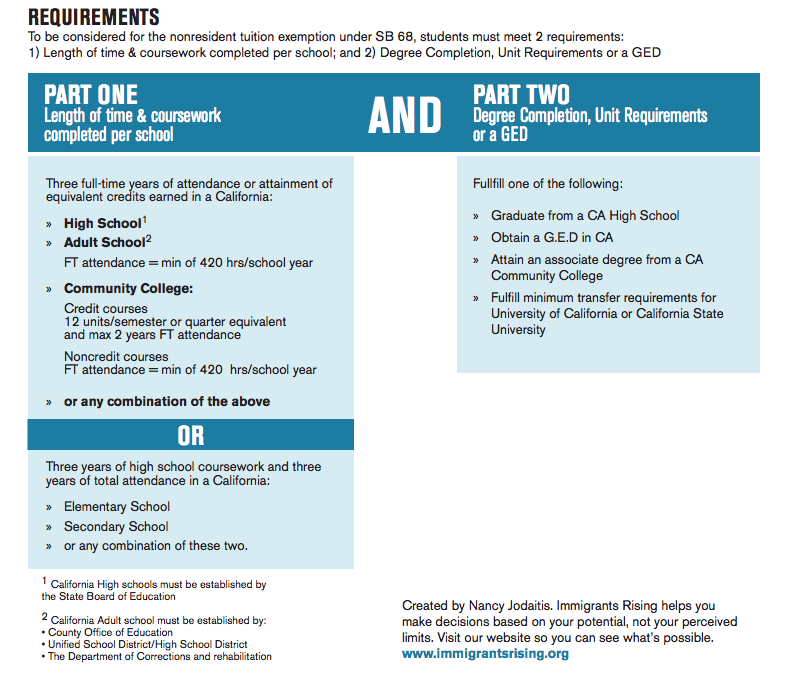Qualifying for Instate Tuition
The state of California and the University of California provide three different pathways for undocumented students to qualify for in-state tuition. The requirements for each of these pathways are:
▶
AB 540
- Must have attended a California high school for 3 or more full academic years
- Must have or will graduate from a California high school or have attained a G.E.D.; or received a passing mark on the California High School Proficiency Exam (CHSPE);
- Must register or is currently enrolled at an accredited institution of public higher education in California;
- Must file or will file an affidavit as required by individual institutions, stating that the filer will apply for legal residency as soon as possible;
- Must not hold a valid non-immigrant visa (F, J, H, L, A, E, etc.)
Submit Affidavit along with Official High School Transcript:
1156 High Street,
Santa Cruz, CA 95064AB540 Affidavit:
Find 4AB540 Affidavit: HERE
Find a Quick Guide to AB 540 HERE
Find System Wide AB 540 FAQ HERE
▶
AB 2000 (2014)
An expansion of AB540.
- Attended a combination of elementary, middle and/or high schools in California for a total of three or more years.
AND
- The student must have graduated from a California high school or attained the equivalent prior to the start of the term (for example, passing the GED or California High School Proficiency exam)
AND
- Must register or is currently enrolled at an accredited institution of public higher education in California;
- Must not hold a valid non-immigrant visa (F, J, H, L, A, E, etc.)
- Must file or will file an affidavit as required by individual institutions, stating that the filer will apply for legal residency as soon as possible
Note: If you qualify for in-state tuition through AB 2000, you should still complete and submit the AB 540 affidavit. The Office of the Registrar will follow-up with additional information.
▶
SB68
Senate Bill 68 expands the requirements of AB 540/ AB 2000 to include attendance at California Community Colleges and attainment of an associate's degree.
SB 68 benefits students who didn’t go to three years of high school in California, it allows students to count full-time attendance at a California Community College, Adult School, Department of Rehabilitation and Correction School, High School, or combination of these schools to meet the 3 years required to be eligible for in-state tuition.
SB 68 benefits students who don’t have a California High School Diploma or didn’t get their GED in California. Students will be able to use an Associate’s Degree or the fulfillment of the minimum transfer requirements for the UCs or CSUs to meet the requirements.
▶
Through CA Residency with DACA
- The University of California residence policy permits consideration of in-state tuition for those individuals who have lived in the state of California for one year and one day while under the Deferred Action for Childhood Arrivals (DACA) program.
- Only DACA students who cannot qualify for AB540 status (or AB 2000) should be encouraged to seek state residency through this option. Those who qualify for AB 540 (or AB 2000) should not seek this option since this option does not grant access to institutional aid through the CA Dream Act.
What's Next?
- After you have accepted an offer of admission to UCSC campus, submit your Statement of Legal Residence through your UCSC Portal (Check your To Do List on your UCSC portal).
- If you then receive a nonresident classification, the campus residence deputy may provide additional forms for you to complete to determine your eligibility for the AB 540 nonresident tuition exemption. Be prepared to provide official California school transcripts and proof of high school graduation.
Once UC grants you in-state tuition, you do not need to re-submit an AB 540 Affidavit as long as your visa status doesn't change and you're continuously enrolled at UC, Santa Cruz.
Please be reassured that all information regarding residency will be protected and only utilized for institutional purposes. All personal and parent information will not be shared with any outside agencies.


